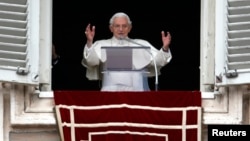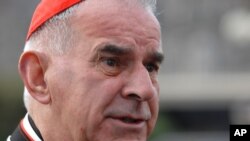Scandal threatens to overshadow Benedict's final days as pope, as well as the preparations to choose his successor.
In one of his last acts as pontiff, Benedict Monday changed the Vatican's constitution, eliminating the 15-day waiting period before cardinals can meet to elect a new pope.
The change comes on the same day the pontiff accepted the resignation of Britain's most senior Roman Catholic cleric.
Cardinal Keith O'Brien resigned following allegations from four current and former priests that O'Brien approached them inappropriately in the 1980s.
Cardinal O'Brien was due to retire next month, when he turns 75. He said Monday he will contest the allegations, but won't take part in the upcoming conclave to choose a new pope.
Other cardinals are also under heavy criticism. On Saturday, Catholic activists petitioned Cardinal Roger Mahony of the United States to recuse himself from the papal election so as not to insult survivors of sexual abuse committed by priests while he was archbishop of Los Angeles.
Pope biographer and Vatican analyst Marco Politi doesn't expect the furor to subside in the near future.
"Pope Ratzinger [Benedict] has began a revolution, asking [for] absolute cleanness about sex abuse," Politi says. "Although with many contradictions, this movement is going on and now it is knocking at the door of the conclave."
However, the cardinals who meet to elect Benedict's successor won't have access to the contents of a special investigation began after leaks of Vatican documents in 2012.
-Chosen by College of Cardinals
-Only cardinals under age 80 are allowed to vote
-They meet in Sistine Chapel for Conclave
-Voting cardinals remain in Vatican without outside contact until they select a pope
-A two-thirds-plus-one vote is required to select a pope
-Paper ballots are counted, pierced with a needle and placed on a single string
-Ballots are then burned, letting outside world know if a pope has been chosen
-Black smoke means no one has been chosen, white smoke means a pope has been selected
-Shortly after white smoke is seen, name of new pope is announced from balcony of St. Peter's Basilica
The report, conducted by three cardinals who are too old to participate in the conclave, is thought to have uncovered problems within the Vatican, possibly tied to the priest-child sex abuse scandal.
A Vatican statement said the report will only be shared with the next pope.
Benedict was elected in 2005 to replace the late John Paul II. He will become the first pontiff to step down in nearly 600 years when he leaves office February 28.
Even with the change in Vatican laws, it's not clear exactly how soon the Roman Catholic Church will begin selecting Benedict's replacement.
Many cardinals have begun informal consultations by phone.
Some church officials hope a new pope is selected by the middle of March, in time to preside over Holy Week services leading to Easter.
In one of his last acts as pontiff, Benedict Monday changed the Vatican's constitution, eliminating the 15-day waiting period before cardinals can meet to elect a new pope.
The change comes on the same day the pontiff accepted the resignation of Britain's most senior Roman Catholic cleric.
Cardinal Keith O'Brien resigned following allegations from four current and former priests that O'Brien approached them inappropriately in the 1980s.
Cardinal O'Brien was due to retire next month, when he turns 75. He said Monday he will contest the allegations, but won't take part in the upcoming conclave to choose a new pope.
Other cardinals are also under heavy criticism. On Saturday, Catholic activists petitioned Cardinal Roger Mahony of the United States to recuse himself from the papal election so as not to insult survivors of sexual abuse committed by priests while he was archbishop of Los Angeles.
Pope biographer and Vatican analyst Marco Politi doesn't expect the furor to subside in the near future.
"Pope Ratzinger [Benedict] has began a revolution, asking [for] absolute cleanness about sex abuse," Politi says. "Although with many contradictions, this movement is going on and now it is knocking at the door of the conclave."
However, the cardinals who meet to elect Benedict's successor won't have access to the contents of a special investigation began after leaks of Vatican documents in 2012.
How The Pope is Selected
How the Pope is Elected-Chosen by College of Cardinals
-Only cardinals under age 80 are allowed to vote
-They meet in Sistine Chapel for Conclave
-Voting cardinals remain in Vatican without outside contact until they select a pope
-A two-thirds-plus-one vote is required to select a pope
-Paper ballots are counted, pierced with a needle and placed on a single string
-Ballots are then burned, letting outside world know if a pope has been chosen
-Black smoke means no one has been chosen, white smoke means a pope has been selected
-Shortly after white smoke is seen, name of new pope is announced from balcony of St. Peter's Basilica
A Vatican statement said the report will only be shared with the next pope.
Benedict was elected in 2005 to replace the late John Paul II. He will become the first pontiff to step down in nearly 600 years when he leaves office February 28.
Even with the change in Vatican laws, it's not clear exactly how soon the Roman Catholic Church will begin selecting Benedict's replacement.
Many cardinals have begun informal consultations by phone.
Some church officials hope a new pope is selected by the middle of March, in time to preside over Holy Week services leading to Easter.









